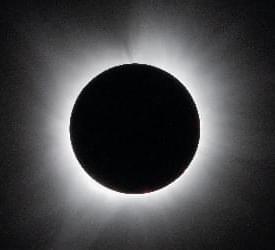New solar observations indicate that plasma waves are responsible for the Sun’s outer atmosphere having different abundances of chemical elements than the Sun’s other layers.
The solar corona is a halo of hot, tenuous plasma that surrounds the Sun out to large distances. It is visible during solar eclipses (Fig. 1) but is usually outshone by the glare of the Sun’s surface, or photosphere. The corona has different abundances of chemical elements than the rest of the Sun, and a longstanding question has been why this disparity exists. New solar measurements by Mariarita Murabito at the Italian National Institute of Astrophysics (INAF) and colleagues suggest that the difference is caused by plasma waves dragging easily ionized elements from the Sun’s lower atmosphere into the corona [1]. This finding could lead to a better understanding of the structure of stars.
The corona is of great interest to solar physicists, partly because it produces the solar wind—an outflow of hot gas from the Sun. The solar wind is most evident to us on Earth when its particles become trapped in Earth’s magnetic field and collide with our atmosphere, causing an aurora. An important problem in solar physics is to determine which coronal structures generate the solar wind and how solar conditions affect the outflow’s properties. The elemental composition of the solar wind sheds light on its origins, as this composition does not change once the gas leaves the Sun. The solar wind can be directly sampled by spacecraft in situ, and its elemental abundances can be compared to coronal abundances inferred from spectroscopy.
